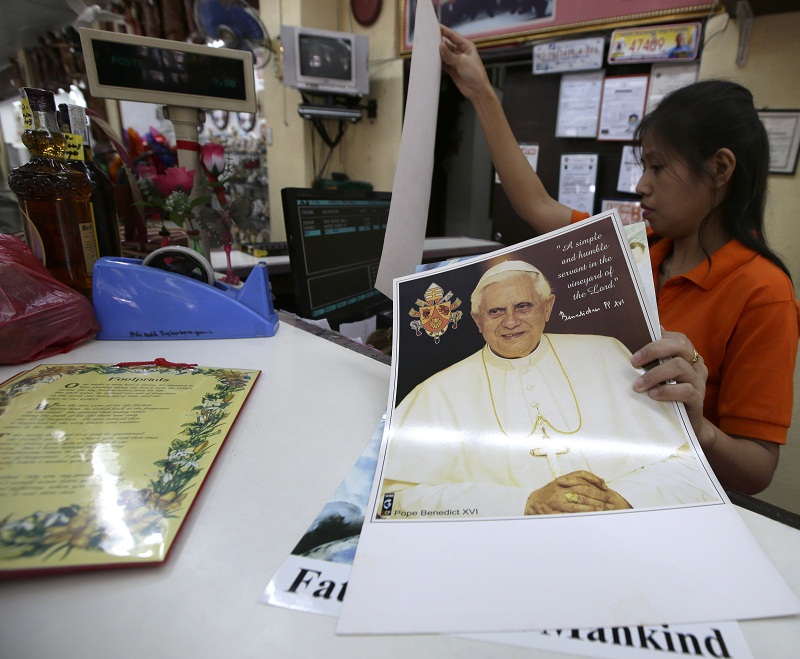
A Filipino salesclerk checks the price of posters, including that of Pope Benedict XVI, at a religious store in Manila on Thursday, Feb. 28, 2013. Pope Benedict XVI formally resigned Thursday, the first pope to abdicate the papacy in 600 years. AP PHOTO/BULLIT MARQUEZ
“Pope Live” follows the events of the final day of Pope Benedict XVI’s papacy as seen by journalists from The Associated Press around the world.
This from the Philippines, an Asian nation where more than 75 million people in the population of 94 million are Roman Catholic:
—Romeo Mercardo, a 45-year-old tricycle driver in front of Manila’s Santa Ana Church, says he’s saddened by Pope Benedict’s resignation. “I think he ran the church well. From what I see even here in our parish, you can see a lot of people going to Mass. People would go to church as early as Saturday, and on Sundays the church is packed,” Mercardo says.
The historic church dating back to the Spanish colonial era held no special Masses today for Benedict, but many Filipinos followed the news from the Vatican on the radio and TV.
—Eden Mendez, 23, a saleswoman in a clothing store: “It’s sad that he has to go. I hope whoever will replace him will also work like him. He did well for the Church.”
—Fortunato Vendivel, a professor at Philippine Normal University: “My wish for him is to get well because he looks really ill, and I think he badly needs to rest.”—Teresa Cerojano
CARDINAL DIES
The French Bishops’ Conference has announced that Cardinal Jean Honoré, who was appointed by Benedict’s predecessor John Paul II, died Thursday, hours before the pope was due to leave office. He was 92.
Honoré, who was Archbishop of Tours from 1972 to 1981, was already over 80 when he was made a cardinal in 2001, so he was unable to vote at the previous conclave in 2005 and would not have voted at the upcoming one either.
He was an expert in the work of the British 19th-century cleric Cardinal John Henry Newman, who was beatified by Benedict in 2010.—Noami Koppel
SWISS GUARDS TO GET A REST
The pope’s retirement means his famous Swiss Guards get a few days off before they have to protect the new guy.
Stern-faced and standing as erect as the halberds they grasp, Swiss Guards rarely betray emotion on duty. But their storied history has its early roots in a bloody drama.
Nearly five centuries ago, 147 Swiss Guard died while protecting Pope Clement VII in his frantic dash to safety when Emperor Charles V’s soldiers sacked Rome.
A few decades earlier, the Renaissance pope, Julius II, had asked Switzerland to supply the Vatican with soldiers because he was so impressed by the courage of Swiss mercenaries.
The Swiss Guards will go off-duty Thursday evening at 8 p.m.—the exact moment when the man they serve, Pope Benedict XVI, resigns.—Frances D’Emilio
IN THE 15TH CENTURY
The last pope to resign was Pope Gregory XII, who stepped down in 1415 to end the Great Western Schism, a nearly 40-year split over leadership of Christendom. The disagreement was a major political struggle since the Church played a central role in politics, art and daily life in much of Europe, which was slowly transitioning into the Renaissance.
During that era:
— Heretics were burned at the stake, including Bohemian-born Jan Hus, a priest considered an inspiration for the Protestant Reformation, in 1415. Joan of Arc, who fought for France in the Hundred Years War against England, died at the stake in 1431.
— The Medicis were building the banking empire that would turn them into a political dynasty, make them influential art benefactors and eventually produce four popes, the first in 1513.
— Early Renaissance artists like Donatello were playing with perspective in sculptures of saints that adorned his country’s ornate churches.—Matt Surman